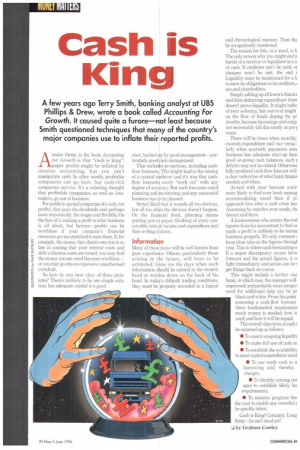Cash is
Page 27

If you've noticed an error in this article please click here to report it so we can fix it.
King
Amajor theme in the book Accounting .for Growth is that "cash is king": paper profits might be inflated by creative accounting, but you can't manipulate cash. In other words, profitable companies can go bust, but cash-rich companies survive. It's a sobering thought that profitable companies, as well as lossmakers, go out of business.
For publicly quoted companies it's cash, not profits, that pays the dividends and, perhaps more importantly, the wages and the bills. On the face of it, making a profit is what business is all about, but beware—profits can be worthless if your company's financial resources are too stretched to earn them. If, for example, the money that clients owe you is so late in coming that your interest costs and debt collection costs are raised, you may find the money you are owed becomes worthless— or you may go into an expensive unauthorised overdraft.
So how do you steer clear of these problems? There's unlikely to be one simple solution, but adequate capital is a good start, backed up by good management—particularly good cash management.
That includes projections, including cashflow forecasts. This might lead to the raising of a cynical eyebrow and it's true that cashflow forecasts rarely "work out" with any degree of accuracy But such forecasts entail planning and monitoring, and any successful business has to be planned.
Stated liked that it sounds all too obvious. but all too often the obvious doesn't happen. On the financial front, planning means putting pen to paper: thinking of every conceivable item of income and expenditure and then writing it down.
Information
Many of these. items will be well known from past experience. Others, particularly those arising in the future, will have to be estimated. Cone are the days when such information should be carried in the owner's head or written down on the back of his hand, in today's difficult trading conditions, they must be properly recorded in a logical and chronological manner. Then thE be scrupulously monitored.
The reason for this, in a word, is Ii The only reason why you might end u hands of a receiver or liquidator is a s of cash. If creditors can't be paid, m cheques won't be met, the end i Liquidity must be maintained for a h to meet its obligations to its creditors., ees and shareholders.
Simply adding up all known financi and then deducting expenditure from doesn't prove liquidity. It might indic of-year solvency, but survival might on the flow of funds during the pr months, because incomings and outgc not necessarily fall due neatly at pre-I times.
There will be times when monthly exceeds expenditure and vice versa; larly when quarterly payments twist business has adequate start-up final good on-going cash balances, such deficits may not be critical. Otherwise fully produced cash.flow forecast will a clear indication of what bank finano needed, and when.
Armed with your forecast you'n more likely to find your bank manag accommodating mood than if yo approach him after a cash crisis has Assuming he satisfies your needs, tin doesn't end there.
A businessman who awaits the end figures from his accountant to find oi made a profit is unlikely to be manal business properly. It's only common keep close tabs on the figures througl year. This is where cash-forecasting o If a major discrepancy occurs betw forecast and the actual figures, it o light immediately and action can be 1 get things back on course.
This might include a further visi bank, in which case, the manager will impressed, and probably more recepti, need for additional help can be pr black and white. From his point assessing a cash-flow forecast three fundamental requiremeni much money is needed: how it used; and how it will be repaid.
The overall objectives of cash he summed up as follows: • To ensure on-going liquidit5 • To make full use of cash re • To establish the availability to meet capital expenditure need • To use ready cash to n borrowing and, thereby, charges; • To identify coming cas ages to establish likely bo: requirements;
• To monitor progress thn the year to enable any remedial be quickly taken.
Cash is King? Certainly. Long King—he ain't dead yet!
J by Graham Cawley












































































































